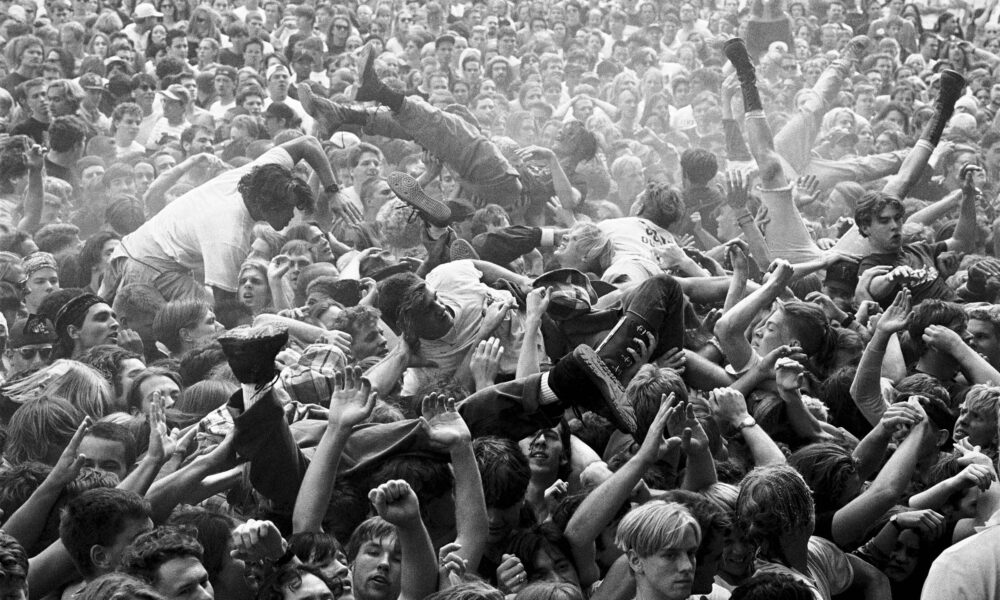The Travis Scott Astroworld Festival tragedy, which left 10 concertgoers dead and hundreds injured, has renewed discussions on the question of violence at music events, leaving many wondering if such a tragedy would have occurred without the influence of mosh pit culture.
Moshing involves pushing and slamming—or sometimes just vigorously dancing with—fellow concertgoers in a space near the stage called the “pit.” Emerging in the late 1980s from the American hardcore punk scene, moshing has since transcended music genres. May it be at a rock or a hip hop concert, a pit of people moving as a large sweaty mass can often be spotted against the stage.
Criticism of moshing has been around for decades. Mosh pits are often considered hazardous, both to the concertgoers who can get injured and to the concert producers who can get sued for permitting them. In 2014, the punk-rock festival Warped Tour banned moshing from their events, with a banner that read, “You Mosh, You Crowd Surf, You Get Hurt, We Get Sued, No More Warped Tour.” After two concert deaths due to moshing—one in 1996 in Dublin and one in 2007 in Vancouver—Billy Corgan, the lead singer of American rock band The Smashing Pumpkins, outright banned moshing and any other violence at his shows.
Many fans of moshing, however, disagree with the idea that the practice is too dangerous. For many, the experience of communally moving against a sway of fellow fans is a cathartic experience, where the adrenaline of a high-stress situation mixes with the oxytocin of close human contact.
“Mosh pits are some of the places I’ve felt the most alive,” said Montreal-born concertgoer Fanny Blanchet in an interview with The McGill Tribune. “There’s really nothing like being in a crowd of bodies moving together and against each other.”
In Montrealer Zacharie Masseau’s experience, there is a certain etiquette for mosh pit participants that prioritizes the safety of those both in and out of the pit.
“With moshing, there are some kind of unwritten rules,” said Masseau in an interview with the Tribune. “Like if you see someone that doesn’t seem too down for it, you can help them out of the pit. And there are certain responsibilities too, that come with where you are in the pit. The people who stand in between the pit and the crowd have the moral obligation to make sure no one outside the pit gets hurt.”
For Masseau, both the audience and the performers must take on the responsibility of making sure the pit remains safe, as the audience are the ones physically creating the flow and dynamic of the pit, and the performers have the authority to step in if they notice something wrong in their audience.
“Once, in a NOBRO concert in Montreal, someone fell down in the mosh pit and everyone stopped moving until the person was safe,” Masseau said. “The mosh pit went from raging to communal aid in a matter of seconds.”
While moshing culture can be risky for concertgoers, there are a host of other factors that can create unsafe concert environments, from a lack of safety measures and restrictions in concert venues to a lack of diligence from artists and producers. Performers who encourage violence in the audience from the security of their stage must understand the risk they are putting their fans in. At its core, the essence of moshing is not violence, but a sense of community and belonging.
Travis Scott has a history of encouraging rowdiness in his audience rather than pacifying it, and clearly failed to act in the best interest of those who attended his concert. Mosh pits, as a sort of extreme sport for concertgoers, are definitely not for everyone, and fans must always understand the physical risks of moshing before joining the pit. But when done responsibly, they can be a truly joyful experience. Rather than leading to further bans on same moshing, the rapper’s fatal failure should act as a lesson for future performers.









